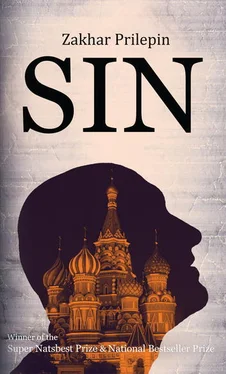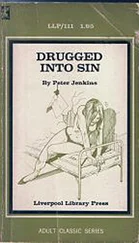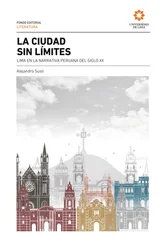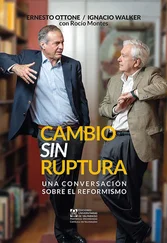After saying this he flapped off in his slippers, back into the depths of the apartment, without saying goodbye.
Vova rang the doorbell again, and getting a reply, pressed his red face against the peep-hole.
“Stud yourself,” Vova said clearly.
It didn’t seem likely that anyone else was waiting for us in this town, and so we settled on the steps of the stairwell, squatting down in a circle: the freezing concrete of the steps was intolerable, even if you wrapped a jacket around your ass.
Vova produced a piece of sausage from out of his coat, and a third of a stick of bread, and a loaf evenly cut in two.
My spirits rose again, and my heart started racing.
In a hurry, we drank, passing the bottle around, and tore the bread in pieces, chewing on the sausage meat in turn. The pie that we had brought from the wake proved to be useful.
We laughed, interrupting each other with every kind of heresy, that was quite worthy of the walls of this stairwell.
A key turned in an iron lock, and the man who had talked to Vova came out.
Vova was sitting with his back to him and didn’t turn around — at that moment he was drinking out of the bottle, and never allowed himself to be distracted from this activity.
“Maybe you’d like a mug?” the man asked.
“Bring us something to wash it down with,” Vova asked hoarsely, lowering the bottle, but without turning around.
I had been drinking for the fourth month now, and I drank every day.
At home — the place where I resided — lived my mother and my sister, who was divorced and had a small child.
I didn’t get up in the morning, to avoid running into my mother, who was hurrying off to work. She always left breakfast for me, but I didn’t eat it. I can’t eat in the morning when I have a hangover.
Lying on the bed, gloomy, feeling as though my head had been squashed, I ran my hands over the bed and noticed that there was no sheet on it. And the blanket had no blanket cover.
“Pissed myself again…”
Screwing up my eyes from the vile sense of shame that made my brain go into spasms, I remembered how my mother and sister had turned me over at night, taking the sheet out from under me. And then, with a gentle movement, they had covered my drunken body with another blanket, instead of the wet one.
After lying there for an hour or so, I went out of my room, saw my sister breastfeeding her baby, and quickly hid in the bathroom. I didn’t wash there, no, I cleaned my teeth, looking at myself in the mirror, with hatred, but not without curiosity.
So that’s what you can do , I wanted to say. And it’s nothing to you… Everything is nothing to you.
It started in December, which was unusually lacking in snow. After the first abundant, wet November snow fell, everything quieted down and melted, the roads turned black again and revolting bushes stuck out, scrawny and bent out of shape with loathing for themselves. In the morning, the puddles were covered with a crust of ice, but there was no snow.
I remember that my sister was still walking the baby in a pram, dressing him in a hundred layers of clothing and wrapping him in three blankets. He lay there, not even able to wrinkle his nose, and breathed in the brittle snowless frost.
Once I took the pram into the stairwell, without the baby, whom my sister was dressing despite his dissatisfied grunting.
After I pressed the button for the lift, I remembered that I had left the pacifier in the apartment, although my sister had just mentioned it.
I went back into the apartment, took the rubber nipple from off the bed, and as I went back into the stairwell, I saw that a man I didn’t know was leaning out of the open door of the lift and briskly rifling through our pram. He was going through the diapers, digging among the pillows and grazing the offended rattles.
“What are you doing, asshole?” I asked in a surprised voice.
“Why did you leave it here?” he replied, snarling with grey teeth.
As I ran to the lift, I noticed that he wasn’t alone in the lift — next to him, evidently, was his wife, and behind him was his daughter, around nine years old, with dull eyes.
He pressed the button, and the lift went up.
With angry leaps I flew up the stairs, and pressing my face to the doors of the lift, I yelled:
“Where do you maggots come from?!”
I saw the cable moving past in the gap in the lift; there was a faint yellow light. The lift didn’t stop.
I ran up another two floors, hoping to overtake it. I flew to the lift but missed it again: the lift went higher, although I had just clearly heard it stopping with a clatter.
“Why are you alive, you piece of crap?” I shouted into the doors of the lift.
Thus, screaming on every floor and tearing up my throat, I ran up to the ninth floor, sat down on the stairs there and cried, but without tears: I drily howled in my heavy melancholy. The lift went down.
I went back down in about seven minutes, with a cigarette between my teeth. My sister was putting the baby in the pram.
“Where did you go?” she asked.
I didn’t answer. I pressed the button of the lift again.
We wheeled the pram out and went off for a walk.
As I looked at the baby, I noticed something on his cheerful red hat.
I leant down and saw that it was a thick, disgusting, pink blob of spit that had spread on the pillow.
The man had gone to the trouble of stopping the lift on the second floor and spitting into the pram.
I rubbed it off with my hand.
As we finished the bottle of vodka, we started doing what we usually did: we collected change and the crumpled, almost worthless notes in our pockets. We put all the money on the step.
This was one of our personal, almost daily repeating miracles — somehow we, who thought that we had no money at all, after shaking ourselves down to the last kopeck, put together just enough to buy a bottle every time. And we even had a few rubles left over for the cheapest and nastiest biscuits.
We had our norm, and we did not usually part until we had fulfilled it. The norm was three bottles per person. The three of us had to drink nine bottles by midnight, or a little later. And only after that did we start to go our separate ways, no longer having any words for farewells or energy for friendly hugs.
Today — still rather sober and much happier than we had been an hour ago — we drank… we gathered our efforts and counted… yes, we had only drunk six bottles.
Two while we were digging the grave. Three at the wake. And another in the stairwell.
So we put together money for the seventh and went out to look for it.
We found a shop and bought everything there that we wanted. The vodka disappeared into Vova’s shapeless jacket, and I put the biscuits in my pocket, feeling their roughness with my fingers.
“I don’t want to drink outside anymore,” I said with capricious sternness.
“Who does?” Vova replied. “What can you suggest?”
I didn’t have any suggestions, and for a while we walked silently, gradually losing the warmth we had accumulated in the stairwell, where at least there wasn’t any wind.
“Hey, a girl I went to school with lived around here somewhere,” Vova suddenly livened up.
“When did you go to school, weirdo?” I asked.
Vova didn’t say anything in reply, and looked at the buildings. They stood in freezing semi-darkness, with their grey sides turned towards each other, completely identical.
Despite the cold, the vodka we had drunk in the stairwell was slowly reaching us: but the drunkenness did not bring joy anymore, it had to be carried, like an extra burden, along with the cold and the darkness.
It was impossible to believe that anything could be good anymore: that warmth and light existed; you miserably wanted to lie down somewhere. But you didn’t want to go home, where you would be watched with suffering eyes.
Читать дальше












